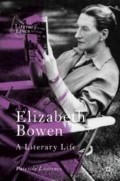Abstract
This biography presents Elizabeth Bowen anew as a public intellectual, spy, cultural ambassador, and propagandist—an independent woman of her time—as well as a writer of fiction. It explodes the myth of Bowen as a reserved, mannered Anglo-Irish writer of “withheld emotion.” It begins by illustrating the rifts in her personality, tracing two paths that divide her. First, Bowen as the inheritor of Anglo-Irish manners and traditions at Bowen’s Court, the family estate in Kildorrery, Ireland; and, secondly, the more fluid, farouche (untamed) aspect of her personality nurtured in her childhood seaside homes in Kent, England. It takes a broader look at the variety of her writing and a bolder stance toward her romantic life, in addition to delving more deeply into her espionage for the British Ministry of Information in Ireland at the beginning of World War II. Multiple views of Bowen as a woman and writer are presented through the conversations of friends, writers, and lovers, spotlighting leading intellectuals like Isaiah Berlin, her lover, Charles Ritchie, and the writers Virginia Woolf, Rosamond Lehman, and Eudora Welty, among others. Observing the changing patterns of Bowen’s kaleidoscopic life will change the way readers read her stories and novels.
Access this chapter
Tax calculation will be finalised at checkout
Purchases are for personal use only
Notes
- 1.
PC, 3.
- 2.
Bowen, “Coming to London,” 79.
- 3.
BC, 419.
- 4.
PC, 24–25, 3, 4.
- 5.
SW, 9.
- 6.
EB to WP, May 6, 1958, DUR 19. Also, Spender, World Within World. Lehmann, Whispering Gallery.
- 7.
Out of a Book, 48.
- 8.
Bowen, “Out of a Book,” 48; Woolf, A Room of One’s Own, 3.
- 9.
LS, 36.
- 10.
Curtis Brown, foreword to PC.
- 11.
EB to Francis King, August 25, 1971, HRC.
- 12.
Beckett, Proust and Three Dialogues, 101.
- 13.
Victoria Glendinning, “The S Word,” Times (London), March 27, 2005.
- 14.
Fisk, In Time of War, ix.
- 15.
See “The Narration of Interiority,” Laurence, Reading of Silence, 13–35.
- 16.
The theories of M.M. Bakhtin, Ferdinand de Saussure, and genetic criticism underpin this biography. Bakhtin asserts the multiplicity of voice, the “polyphony” dramatized in this biography’s many voices; Saussure’s principle of “interdependence” in creating any “value” is demonstrated in presenting not only Bowen’s work but what exists outside of it; and genetic criticism’s broad process that includes historical and literary documents and others’ letters and writings as undercurrents in a writer’s final text is observed.
- 17.
Banville, “Sunday Feature, Centennial Program, 1999,” BBC, NSA.
- 18.
Lee & Lively, “Woman’s Hour,” December 8, 2008, BBC, NSA.
- 19.
WL, 14, 101, 137.
Author information
Authors and Affiliations
Rights and permissions
Copyright information
© 2019 The Author(s)
About this chapter
Cite this chapter
Laurence, P. (2019). Introduction. In: Elizabeth Bowen. Literary Lives. Palgrave Macmillan, Cham. https://doi.org/10.1007/978-3-030-26415-4_1
Download citation
DOI: https://doi.org/10.1007/978-3-030-26415-4_1
Published:
Publisher Name: Palgrave Macmillan, Cham
Print ISBN: 978-3-030-26414-7
Online ISBN: 978-3-030-26415-4
eBook Packages: Literature, Cultural and Media StudiesLiterature, Cultural and Media Studies (R0)

